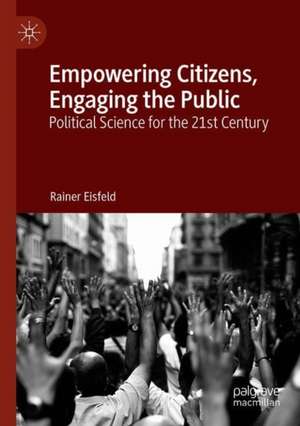Empowering Citizens, Engaging the Public: Political Science for the 21st Century
Autor Rainer Eisfelden Limba Engleză Paperback – 21 feb 2019
This book is the first comprehensive study to respond to the ongoing debates on political sciences’ fragmentation, doubtful relevance, and disconnect with the larger public. It explores the implications of the argument that political science ought to become more topic-driven, more relevant and more comprehensible for "lay" audiences. Consequences would include evolving a culture of public engagement, challenging tendencies toward liars’ rule, and emphasizing the role of “large” themes in academic education and research, the latter being identified as those areas where severe democratic erosion is occurring – such as escalating income and wealth disparities pushing democracy towards plutocracy, ubiquitous change triggering insecurity and aggression, racist prejudice polarizing societies, and counter-terrorism strategies subverting civil liberties.
Political science needs to address these pressing problems ahead of other issues by in-depth research andbroadly accessible public narratives, including solution-orientated normative notions. This need provides the final justification for evolving a discipline where problems would take priority over methods and public relevance over sophisticated specialization.
Preț: 145.35 lei
Nou
Puncte Express: 218
Preț estimativ în valută:
27.81€ • 29.11$ • 23.15£
27.81€ • 29.11$ • 23.15£
Carte disponibilă
Livrare economică 10-24 martie
Livrare express 22-28 februarie pentru 46.26 lei
Preluare comenzi: 021 569.72.76
Specificații
ISBN-13: 9789811359279
ISBN-10: 981135927X
Pagini: 209
Ilustrații: XXVI, 199 p.
Dimensiuni: 148 x 210 x 17 mm
Greutate: 0.28 kg
Ediția:1st ed. 2019
Editura: Springer Nature Singapore
Colecția Palgrave Macmillan
Locul publicării:Singapore, Singapore
ISBN-10: 981135927X
Pagini: 209
Ilustrații: XXVI, 199 p.
Dimensiuni: 148 x 210 x 17 mm
Greutate: 0.28 kg
Ediția:1st ed. 2019
Editura: Springer Nature Singapore
Colecția Palgrave Macmillan
Locul publicării:Singapore, Singapore
Cuprins
1. Improving the Human Condition.- 2. What Is the Current Human Condition?.- 3. Coming to Grips with Change.- 4. Serving Citizens.- 5. The Civics of Friendly Persuasion.- 6. A Determination to Blow the Whistle.- 7. Affirming Ethno-Cultural Diversity, Avoiding Tribalized
Segmentation.- 8. Low Income, Inferior Education.- 9. Robust Regulatory Policies for Capitalism.- 10. Global Warming, Power Structures, and Living Conditions.- 11. Radicalization, Terrorism, Subversion of Civil Liberties.- 12. Twenty-First-Century Political Science: Politicization of a Discipline?
Segmentation.- 8. Low Income, Inferior Education.- 9. Robust Regulatory Policies for Capitalism.- 10. Global Warming, Power Structures, and Living Conditions.- 11. Radicalization, Terrorism, Subversion of Civil Liberties.- 12. Twenty-First-Century Political Science: Politicization of a Discipline?
Notă biografică
Rainer Eisfeld, Professor Emeritus of Political Science at Osnabrück University, Germany, taught at UCLA as a Visiting Professor. He has represented IPSA’s research committees on the IPSA Executive Committee, and has also served on the Board of Trustees of the Buchenwald/Mittelbau-Dora Concentration Camp Memorial.
Textul de pe ultima copertă
“Eisfeld’s analysis of political science and its limits offers a bold framework for reforming the discipline in this century. Eisfeld asks us to look at foundational issues of democracy in the broadest possible terms.”
—Dianne Pinderhughes, former APSA President, University of Notre Dame
“Of major significance for the debate over 21st century political science, impressive in its intellectual scope.”
—Marian Sawer, former AAPSA President, Australian National University
“An intellectual commitment to ‘thinking big’, and a bold vision of the social sciences’ ‘promise’ - freeing citizens from feeling trapped through public engagement.”
—Matthew Flinders, former PSA President, University of Sheffield
“A remarkable project, pulled off with a grace and balance that belie the complexity and controversy of the issues Eisfeld addresses.”
—Leslie A. Pal, former CPSA Board Member, Carleton University, Ottawa
This book is the first comprehensive study to respond to the ongoing debates on political sciences’s fragmentation, doubtful relevance, and disconnect with the larger public. It explores the implications of the argument that political science ought to become more topic-driven, more relevant and more comprehensible for "lay" audiences. Consequences would include evolving a culture of public engagement, challenging tendencies toward liars’ rule, and emphasizing the role of “large” themes in academic education and research, the latter being identified as those areas where severe democratic erosion is occurring – such as escalating income and wealth disparities pushing democracy towards plutocracy, ubiquitous change triggering insecurity and aggression, racist prejudice polarizing societies, and counter-terrorism strategies subverting civil liberties.
Political science needs to address these pressing problems ahead of other issues by in-depth research and broadly accessible public narratives, including solution-orientated normative notions. This need provides the final justification for evolving a discipline where problems would take priority over methods and public relevance over sophisticated specialization.
Rainer Eisfeld, Professor Emeritus of Political Science at Osnabrück University, Germany, taught at UCLA as a Visiting Professor. He has represented IPSA’s research committees on the IPSA Executive Committee, and has also served on the Board of Trustees of the Buchenwald/Mittelbau-Dora Concentration Camp Memorial.
Caracteristici
Responds to ongoing debates on the fragmentation of the political science discipline, its relevance, and disconnect with the larger public Explores the implications and consequences that political science ought to become more topic-driven, more relevant for "lay" citizens, and more comprehensible to such audiences Argues that political science should evolve into a topic-driven discipline focusing on causes, patterns, and the participatory implementation of political, economic, and cultural change
